Three events were organised within the open lecture series, on 12 August, 3 October and 7 November 2019. The events included open lectures given by three international scholars. The lectures were followed by seminars and panel discussion providing a space for analytical and critical reflections on the ongoing change processes in the Tampere universities. The conversations during the events introduced perspectives of different higher education actors and explored possible avenues of improvement in the future.
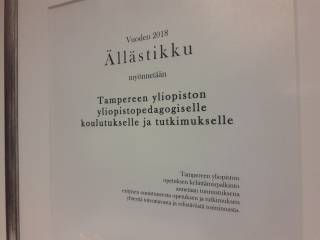
The lecture series was funded by the Ällästikku Teaching Prize of the year 2018. University of Tampere awarded the prize to teachers and researchers in university pedagogy for successful implementation of the research-teaching nexus in universities’ pedagogical activities.
More information about the speakers, the presentation slides and videos are available on the webpage of the lecture series.
What do students gain in higher education?
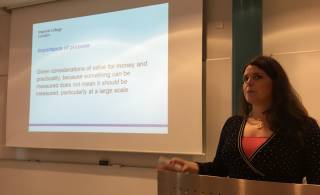
The first open lecture and seminar organised on 12 August 2019 focused on the student perspective on higher education. In her keynote “Transformative student learning gains”, Camille Kandiko Howson, Associate Professor of Education in the Centre for Higher Education Research and Scholarship (Imperial College London, UK) presented research into student learning gain and HEFCE/OfS Learning Gain Programme implemented in England. Over 70 universities and colleges were involved in 13 collaborative projects to pilot and evaluate a range of approaches for measuring learning gain, i.e. improvements in knowledge, skills, work-readiness and personal development made by students during their time in higher education. Dr Camille Kandiko Howson was appointed as an external researcher to evaluate outputs and outcomes, and draw out collective findings.
Students’ pathway through higher education is circular rather than linear, and learning occurs across many dimensions varying over time and direction. The projects showed the complexity of measuring learning gain, as Kandiko Howson describes, “There is a need for multiple measures to capture the variety of learning gain and these measures need to be taken at multiple points in time.” Learning gain approach captures three dimensions, namely general cognitive gain, soft skills development, employability and career readiness of students. As such, the approach has proven to be a useful way for the institutions as well as for the students to understand better the student progress in higher education.
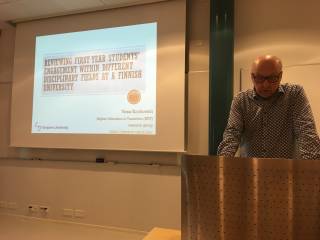
Two presentations that followed Prof Kandiko Howson’s lecture also focused on student learning in higher education. Vesa Korhonen, HET group leader and Research Director in the Faculty of Education and Culture (Tampere University) presented his research on student engagement in higher education studies. In his presentation “Reviewing First Year students’ engagement within different disciplinary fields at a Finnish university”, Korhonen emphasised that engagement emerges in the reciprocal relationship between individual and collaborative aspects of learning and studying. A sense of belonging to the university community together with the identity processes and student’s self-confidence are also closely related to one’s engagement in higher education studies.
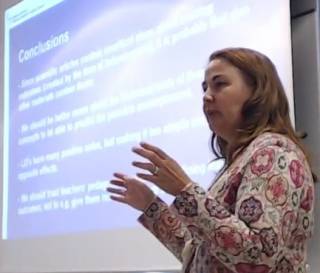
Mari Murtonen, Professor of Higher Education Pedagogy in the Faculty of Education and Culture (Tampere University) discussed the concept of learning outcomes used in higher education. In her presentation, “Desired learning outcomes: benefits and pitfalls”, Murtonen examined the behaviouristic epistemology behind the idea of learning outcomes. In higher education nowadays, learning is understood as a complex development of expertise. According to Murtonen, the learning outcomes approach often narrows the knowledge down to behaviour and thus is incompatible with the modern understanding of knowledge and learning.
What is a transformative power of university curriculum?
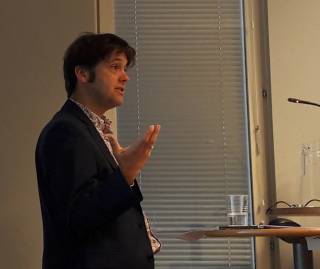
The second event held on 3 October 2019 examined the processes and aims of the curriculum changes in higher education. Paul Ashwin, Professor of Higher Education in the Department of Educational Research (Lancaster University, UK), gave the open lecture “Transforming university teaching and curriculum”. Prof Ashwin addressed the transformative power of the university curriculum: “There is a deliberate double meaning in the idea of transforming university teaching and curriculum. The idea that it can be transformative for students, but also the idea that we might need to change what we do, what we teach, when we design curricula”. To transform university teaching and curricula, according to Ashwin, we need to develop clearer accounts of why the knowledge we are giving students access to is powerful, and what it will enable students to do in the future; this powerful knowledge should be accessible to all of our students.
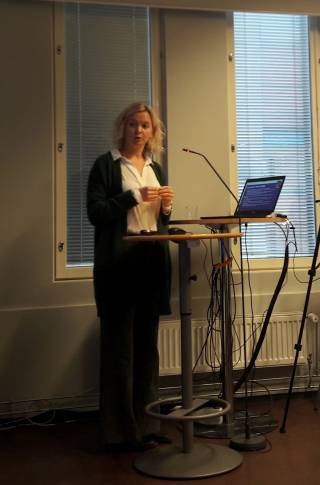
Development of university curriculum was addressed also in the two presentations that followed the keynote lecture. Lotta-Maria Sinervo, University Lecturer in the Faculty of Management and Business (Tampere University) and Anna-Aurora Kork, Postdoctoral Researcher in the Faculty of Management and Business (Tampere University) discussed the case of curriculum design in the study programme on public financial management. Their presentation “Between theory and practice: controversial outcomes of curriculum development in public financial management” outlined some of the lessons learned during the curriculum design process which they described as a “highly complex social process”. The crucial issue that the educators in the study programme need to address jointly, according to Sinervo and Kork, is the shared understanding of curriculum in relation to the key focus of the study programme.
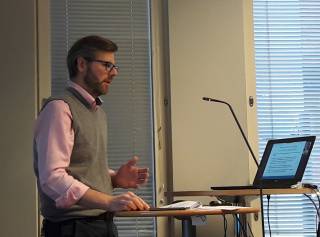
Jyri Lindén, HET researcher and University Lecturer in the Faculty of Education and Culture (Tampere University) and Johanna Annala, HET group leader and Senior Lecturer in the Faculty of Education and Culture (Tampere University) concluded the event with their insights into “The relationship between knowledge and competencies in higher education curriculum”. Lindén and Annala drew attention to the role of knowledge and knowing in the ongoing curriculum reforms in the Finnish higher education – the reforms that they characterise as competence-based. Drawing on the immediate needs of the working life, it seems that “the knowledge has disappeared and it doesn’t exist in the discussions on higher education today; we rather refer to competences only”, Lindén and Annala claim. We need a place for conceptual, abstract knowledge in higher education; a place to build understanding on relativity of knowledge, and the inner logics of knowledge.
How to internationalise university experience?
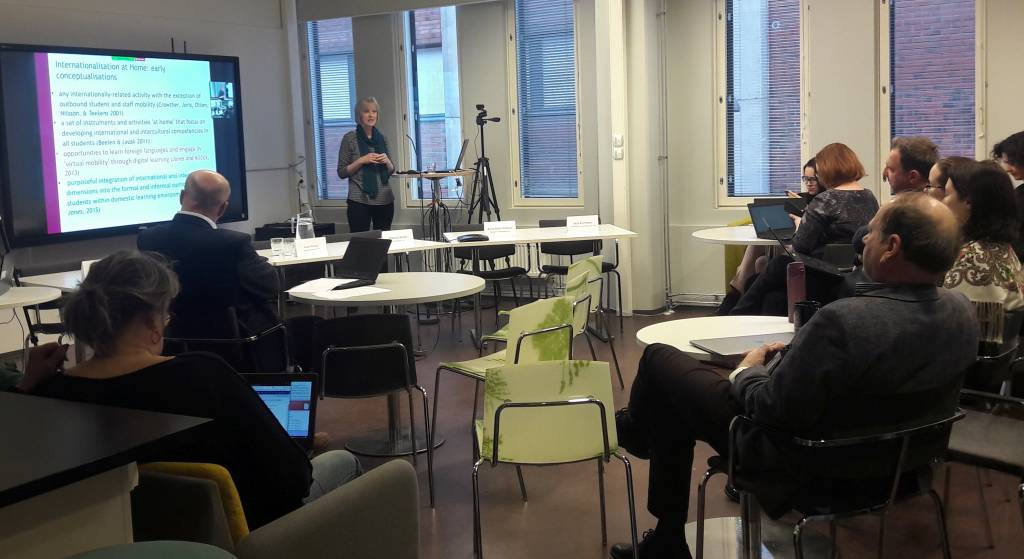
The third event held on 7 November 2019 included an open lecture entitled “Internationalisation in transition in higher education” and a panel discussion on related topics. The open lecture was given by Sue Robson, Emerita Professor of Education (Newcastle University, UK). “Internationalisation is perhaps permanently in transition”, Prof Robson reflects, “making a genuine international culture and community within our institutions takes a lot of effort and a lot of work”. Robson discussed the phenomenon of “internationalisation at home” drawing on the results of the recent project she was involved with, the Approaches and Tools for Internationalisation at Home (ATIAH). The ATIAH project team set out to gather the perspectives of staff and students across several European institutions, on their experiences of internationalisation at home and to gather examples of innovative practice. According to Robson, internationalisation at home should enable all staff and students, particularly the non-mobile majority, to have an internationalised university experience. Institutional internationalisation requires multilevel approach including strategizing and leadership, curricular and co-curricular elements as well as structures and opportunities for professional development and recognition.
Four panellists representing the Tampere University community discussed internationalisation in higher education: Anne Mäki-Rahkola (Specialist in International Affairs and Advocacy, Student Union of Tampere University TREY), Leena Uski (member of the Strategic International Development Team), Jussi Kivistö (Professor of Higher Education Management, Faculty of Management and Business), and Rebecca Boden (Research Director, New Social Research). Vesa Korhonen moderated the panel discussion that was concluded with final reflections by Prof Robson.
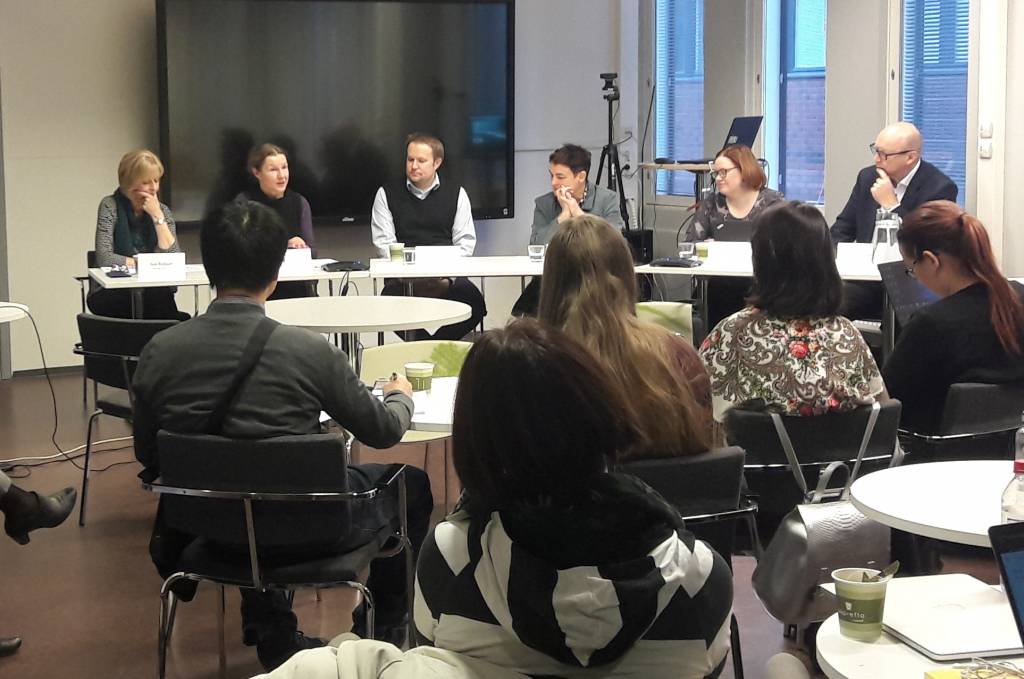
The panellists discussed and questioned the common assumption that the increased number of international staff and students on campuses automatically leads to increased internationalisation; it was stressed that the institutions need to develop forums that will facilitate the interaction between the international and local members of the university community. The discussion addressed also the challenge that the international mobility encounters in the context of the environmental considerations of carbon offsetting; developing virtual mobility was seen as one of the possible future directions of international mobility.
Text: Vesna Holubek
Photos: Johanna Annala & Vesna Holubek
